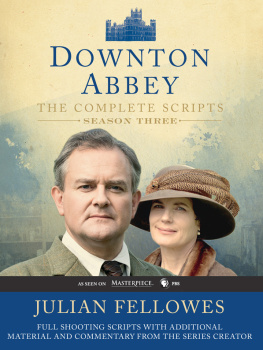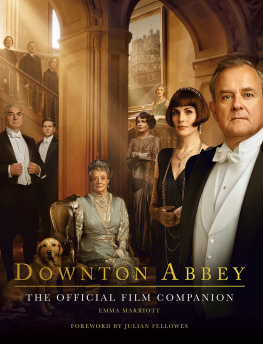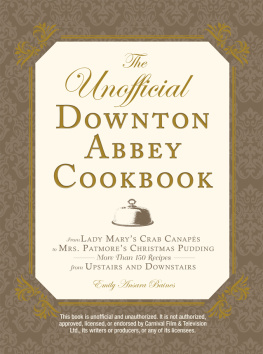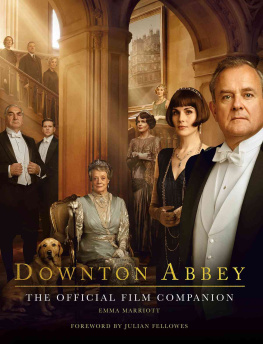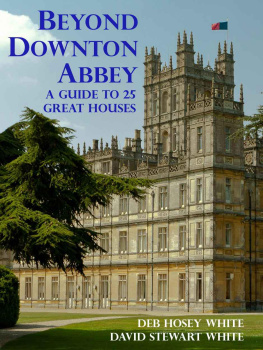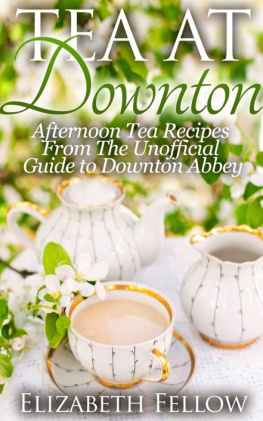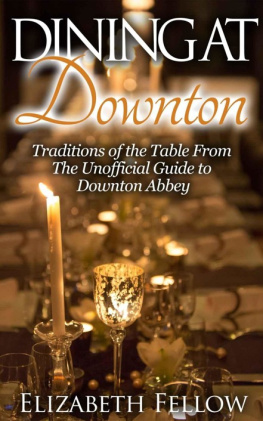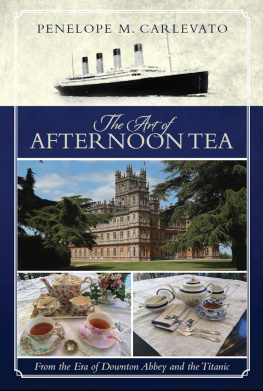


Violet
No family is ever
what it seems from
the outside
CONTENTS
JULIAN FELLOWES
FOREWORD
O ver the last two rather extraordinary years, at the risk of sounding vain, I have often been asked why I thought Downton Abbey has been quite such a success. Of course it is hard to be definite about these things. If television were an exact science, there would be nothing made that did not break records. But supposing I were to put my finger on one element, it might be that we have made the decision to treat every character, the members of the family and the members of their staff, equally, in terms of their narrative strength. They all have emotional lives, dreams, ambitions and disappointments, and with all of them we suggest a back story. So this book, which is an invitation to get to know the characters and their backgrounds more fully, will, I hope, build on that and allow the reader to develop his or her relationship with the figures in our landscape.
In a way, the decision to write the show at all came out of emotional, rather than historical, curiosity. When Gareth Neame made the original suggestion that we should together travel back into Gosford Park land, this time for television, I was initially undecided, but it so happened that I was reading a book, To Marry an English Lord, which was about the Buccaneers those American heiresses who arrived in such numbers during the 1880s and 90s, to rescue many great houses in distress. It occurred to me that while people had a mental image of beauties like Consuelo Vanderbilt or Cornelia Bradley-Martin stepping ashore into the (not always very willing) arms of a waiting nobleman, few bothered to think about those same women, 20, 30, 40 years later, marooned in some freezing country house in the Midlands, with envious thoughts of their sisters in their comfortable, centrally heated cottages in Newport. Most of them outlived the way of life they had arrived to save, dying in the 1950s and 60s, having devoted the years to a social and political system that the century finally rejected. How did they deal with that? It is not surprising that such ruminations led to more thinking and more characters, until I had made the decision to take on the job and the series was born. So, you could say Cora Grantham was the mother of Downton Abbey, which is no doubt just as it should be.
Few people shake off the family influences they were born into, and I am not among them. My relations, when I was young, were numerous and omnipresent and, inevitably I suppose, they seem now to abandon their graves and settle into the pages of my scripts with increasing regularity. I have spoken before of my impressive, if tyrannical, great-aunt, Isie, who is the principal model for Violet Grantham (and also for Lady Trentham in Gosford Park, before that), a woman whose dry wit concealed a good deal of personal suffering and who was no tougher on the rest of us than she was on herself. It is perhaps that draconian sense of personal discipline that makes her breed seem admirable to me. But my family has contributed the outline sketches for more than the Dowager. Robert Grantham is definitely drawn, in his personality if not his circumstance, from my dear departed father. In this, I mean to convey that he was a deeply moral man, cleverer possibly than Robert, who was always determined to do right, but without ever contesting the structure of his own social universe. One of my brothers remarked that if Pa had crashed in the desert and somehow found a parking meter buried in the sand, he would be sure to put the correct money into it. This stuff dies hard in us and not long ago, when I discovered I had taken change for a 20 pound note instead of a tenner from the branch of Tesco in Trafalgar Square, I journeyed across London the following day to pay back the excess. Rather sadly, the amiable manageress clearly thought I was mad.
But, as I say, my father never questioned his place in the world, either its advantages or its disadvantages. Like Robert, he strove to do his duty and, also like Robert, he thought that if it were Gods will that you should be rich, then He would ensure you were left an inheritance. There was something vaguely distasteful to him about striving to make money, as there is to Lord Grantham. He was not, of course, anti-Catholic as Robert is (vaguely), because we are a Catholic family. But I remember him once saying that he thought religions were rather like clubs. There was not much wrong with any of them, but it seemed ill-bred to change. It is something Robert might easily say. And probably will. I have been accused in the press of being too concerned with class, and thereby a snob. There is some truth to the first, since I am fascinated by the shaping effect of the random selection of class, and how, even today, it has a lasting influence on our aspirations and prospects. A recent report for the Labour Government concluded that birth remained the greatest determinant when it came to our futures in modern Britain. This seems extraordinary to me, partly because I grew up in the 1960s, a generation that assumed all such stuff was coming to an end, and if you had asked anyone in 1968 how important class would be in 40 years time, they would have laughed in your face. But perhaps I have a greater sensibility because, to a degree, I was brought up in a class minefield. My fathers birth was grander than my mothers, his relations therefore disapproving of both her family and her, and she was condemned to the unenviable task of making everything in their life seem smooth and seamless when it was in fact riven with stitching. She was a strong woman and in her youth a great beauty, which is a powerful social tool even if it carries a sell-by date, but it was never plain sailing, all the same. The gap today would not feel wide, she from the respectable middle class, he from what one of my brothers refers to rather caustically as the landless gentry, but in 1935, the year of their marriage, it was a chasm. The cool dismissals, the veiled snubs, the cold-shouldering of a friendly gesture, I have witnessed them all, both through the puzzled eyes of childhood, and with the more knowledgeable vision of later on. I suppose standing, as it were, on both sides of the divide has influenced my work, but, as anyone logical could tell, the accusation of snobbery is wide of the mark. It is precisely because I identify with both teams that my writing, if I am allowed to say so, aspires to a kind of social justice which, I believe anyway, is one of the reasons it has reached so wide an audience.
It was the maid of a cousin of my grandfathers, an auxiliary great-aunt to us boys, who inspired OBrien, one of my favourite characters. She had started out as a ladys maid, but when the old world disintegrated, she graduated to companion and remained in this post until the death of her employer. On the surface, she was as polite as a courtier, but she had a black heart, cold and manipulative, and gradually forced all her mistresss family and friends away, until she ruled their Knightsbridge house alone. Yet my aunt never saw it. As far as she was concerned, she had a faithful retainer who wanted nothing but her good, and she never made the connection with the absence of her family in the later years. I was once told by a viewer that the only detail he didnt recognise from the world of his youth was the devious ladys maid. But the records show he was wrong. As a breed, they were notorious for their complex and prickly nature, fraught with terrors about any possible challenge to their status. Siobhan Finneran gives us a wonderful example of this type; hard, calculating and yet vulnerable when it comes to OBriens own feelings. I love her.
Next page

